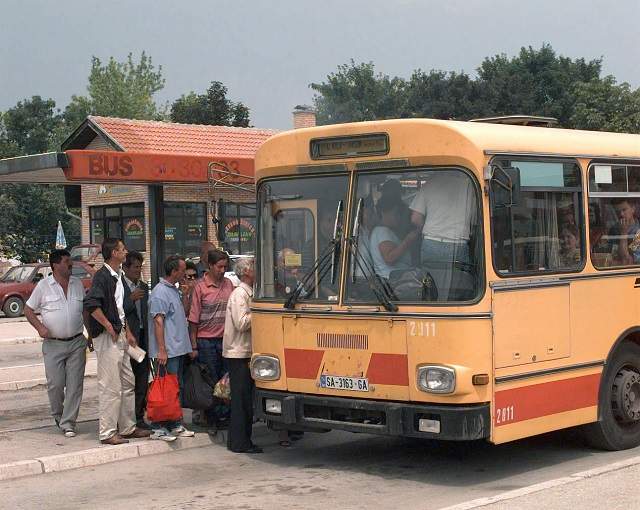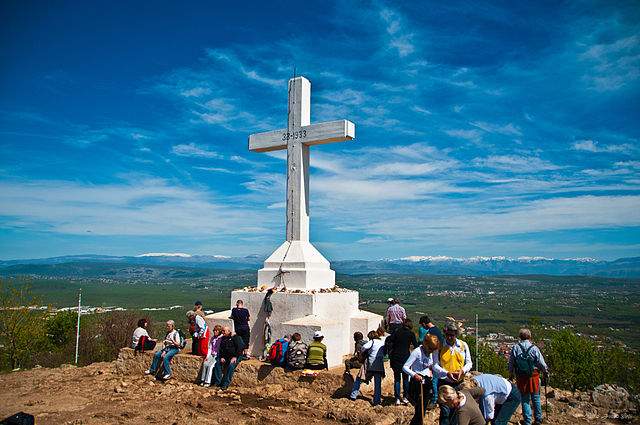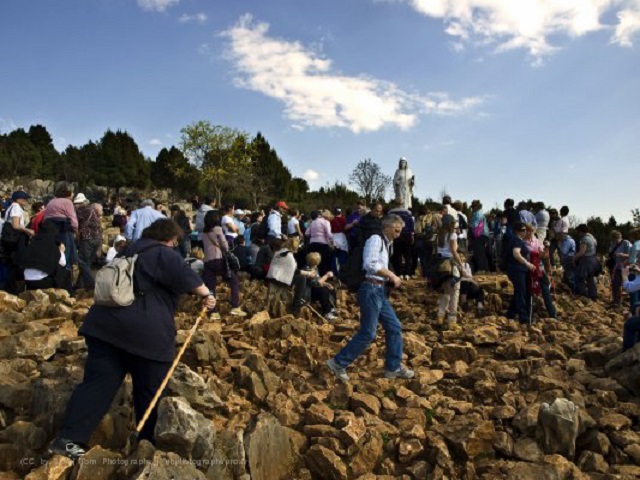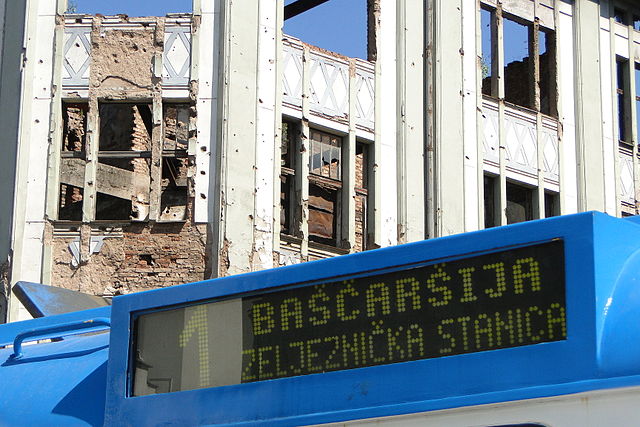At seven in the morning, I leave my hostel in Dubrovnik, Croatia, and walk to the bus station. It’s already almost 90 degrees Fahrenheit, and within minutes I feel a semicircle of sweat spreading across my lower back underneath my pack. I sweat more than the locals, some of whom are sitting with steaming cups of espresso and chocolate croissants which somehow aren’t melting under their fingers. My ticket to Sarajevo is damp in my back pocket, as are the Croatian kunas that I try to exchange. The change operator tells me that they don’t deal in Bosnian marks, and suggests that I convert to euros instead. I want to ask him why they don’t have Bosnian marks, given that they’re next-door neighbors and that Dubrovnik-Sarajevo is a popular tourist route, but he counts euros quickly into my hand and shoos me away.
It’s then that I wonder, as I always do as I’m about to board a bus for a new destination, where exactly I’m going and what I hope, want, and need to find there. Just the name Sarajevo sounds like a place in a fairy tale, but I know that it won’t be like the images evoked by its name. The guidebook talks primarily about the ruins—the hotel that was bombed, the first bridge to come under sniper fire, the National Library that was burned to ash. Almost everything the guidebook suggests involves seeing the city’s wounds, which sounds like a strange way to spend a vacation. Yet something draws me there. From the minute I landed in Berlin, I’ve made my way south toward Sarajevo, toward something I can’t name, something I can’t quite fathom just yet.
As I wait to board the bus, my eye is drawn to a round, scraggly-haired gentleman leaning on his thin cane. Sweat runs profusely down his grey beard, which rests in wet straggles on the small triangle of his exposed chest. He’s the only person sweating more than me, and I find myself musing vaguely about what he’ll smell like by the time we get to Sarajevo.

I stow my bag in the compartment underneath, board the bus, and find my seat. The air conditioning on the bus is broken, and I pinch the latches on the corners of the window and manage to push it down about an inch. I sit in the window seat under the sun, hoping that no one sits next to me so I can scoot over into the shade. After a few minutes, the bearded man boards the bus, lumbers down the aisle, and heaves himself into the seat next to me.
It’s impossible to tell his age or nationality or social status—he could be from anywhere, going anywhere. Even though I don’t know anything about him, he seems at a glance to be my opposite.
I steal sideways glances at my seatmate from behind my sunglasses. His face of weathered peaks and valleys reads like a relief map. It’s impossible to tell his age or nationality or social status—he could be from anywhere, going anywhere. Even though I don’t know anything about him, he seems at a glance to be my opposite, like someone who belongs in an entirely different world than me. That we share a destination, even for just a short while, amazes me in its sheer randomness—I marvel at the countless small details that had to line up just so to put us next to each other on this bus. As the bus pulls away from the station, he reaches into his pocket and pulls out a rosary with his big sausage fingers. The bus driver finds a polka station on the radio and cranks the volume.
A while later, the bus driver pulls over at a restaurant and makes an announcement in Croatian. A few people get off the bus. I hover, half out of my seat, wanting to stretch my legs but unsure what the driver said. Next to me, the bearded man hauls himself up, gathers his cane from under the seat, and says to me in a soft British accent, “The bus will be leaving in 10 minutes.”
This seems to break the ice; at least now we know we share a language. When we re-board, he points at my iPod and asks if it blocks out the “awful oompa oompa” of the bus radio. I laugh and tell him no, it doesn’t. He clucks sympathetically and clicks a couple of beads together in his hand.
[social]
I confirm that he’s British and ask him how he knows Croatian. He tells me that he’s been here many times and has a facility for languages. As we wind through the mountains, he tells me that he grew up in London, studied at the Vatican in his early twenties, lived in New York City and then Los Angeles, and spent the last 13 years living in a remote Spanish village in New Mexico acting, as far as I could understand, as a kind of spiritual and educational guru. He translated religious and spiritual messages and information for the people there, not as a missionary, but as someone happy to have conversations that might facilitate understanding and beliefs that would contribute meaningfully to their lives. I pictured him sitting on top of a hill somewhere waiting for people to journey up to him to ask him questions. I nodded as though I understood what he was talking about and what he did for these people, but in truth I couldn’t quite wrap my brain around it.
He doesn’t seem interested in converting me, or in trying to get me to go to Medjugorje. He doesn’t ask about my faith or lack thereof; he simply tells me this story, one hand turned palm up on his knee.
Some part of me wonders if he’s having me on. Perhaps he’s crazy, perhaps he’s got an active imagination, perhaps he reinvents himself with each conversation. Travelers can shed identities like snake skins. But there’s something about this man that is too real, too present to be doubted—maybe it’s the sweat quivering at his temples, or the coil of his beard, or his fingers, which remind me of my grandpa’s fingers, clumsy and deft at the same time, fumbling but strong. These details are too heartbreakingly intimate to be forged, and they seem to confirm something essential about this man—something spiritual and graced, yet entirely real.
He surmises that I’m going to Sarajevo. “Lovely city,” he says. He’ll be getting off in Mostar, where he’ll connect to another bus to a small village called Medjugorje. I’ve never heard of it. He tells me the story of how in 1981, the Virgin Mary appeared to six children with messages from God. In addition to the basic message that God exists and wants people to refocus on Him, “Our Lady” had ten secrets to tell the six visionaries; ostensibly, some of the secrets were personal, while others were universal.

I’m not entirely sure how to receive this information. He recounts the story in a neutral tone, every now and again turning his head toward me and nodding gravely. The beads of his rosary click in his pocket like a metronome. He doesn’t seem interested in converting me, or in trying to get me to go to Medjugorje. He doesn’t ask about my faith or lack thereof; he simply tells me this story, one hand turned palm up on his knee.
“This is not something many people know about in America,” he adds. “In Europe, perhaps. In Eastern Europe, absolutely yes. But in America people do not know quite what to do with these stories.”
I can’t argue with that, especially given that I’m one of those people. “People in America will say they see the Virgin Mary on a tortilla, and then they sell it on the Internet,” I offer.
He smiles. “It’s strange, isn’t it, the way people express faith? I’m a believer in creative interpretation and expression as long as the belief is there. I think the problem with many Americans is that they’ve lost their sense of wonder. Something like this can only be a joke to them—they don’t think for a second that it could actually be true. This is part of why Our Lady appeared to the visionaries in the first place.”
“To convert the skeptics?” I ask, conscious of my own skepticism.
“To remind the believers to pray for them,” he says.
We both sit in silence; I think he knows that I’m chewing all this over, and knows better than to press it. I think about all the people—hundreds of thousands per year, he says—who make pilgrimages to this village, desperate to believe in something. I wonder what they do when they get to the village and no vision appears to them. I imagine that most wouldn’t admit it; if they were there, amid other seekers of the miraculous and holy, they would pretend to see something, probably so fervently that they would convince themselves of their vision. A place like Medjugorje seems like it would function as a theological mobius strip: people go there to see miracles, convince themselves that they’ve seen miracles, and then tell others of their experience, which causes more people to go. It seems like a con of the longest kind.
The man closes his eyes and rests his head on the headrest. Sweat drips down his temples and he holds his cane upright between his knees. I put my iPod away, just in case he thinks that I’m too plugged in to talk to him. The terrible polka continues blaring on the bus speakers.
“I would almost rather be watching MTV,” he says after a few minutes, his eyes still closed.
“That’s saying a lot,” I say.
“I did say ‘almost,’” he says, chuckling. He passes his hand over his face and opens his eyes.
“Have you been to Medjugorje before?” I ask.
“This will be my seventh time,” he says, smoothing his beard. “When I worked in the Vatican I went often.”
“So have you seen the Virgin Mary? Have you received secrets?” I’m not sure if I’m allowed to ask these questions, but even if he refuses to answer, I know he won’t be offended.
“If I tell you what has happened to me there, you probably wouldn’t believe it,” he says. “What happens to me there is my truth, my messages from God, which I have indeed received. All I can really tell you is that every time I’ve gone there, I’ve found exactly what I was looking for.” He covers the top of his cane with both of his hands, as though in quiet benediction.
“Is there a specific reason you’re going now?” I ask.
“There is,” he says, reaching his hand into his pocket for his beads. “I’m going to have a pray for my daughter. She was recently diagnosed with terminal breast cancer. She has four kids.” He says this with no change in tone, though more slowly than the beat of his rosary.
“I’m so sorry,” I say, annoyed that I can think of nothing better than this generic platitude.
He nods and works the beads in his pocket.

Questions begin mounting in my mind. What exactly will he do when he gets there? Is there a specific place to go? Is there a ritual of some kind? Is Mary just supposed to appear? Does she appear to the masses or to people individually? Will he have to wait in line or will he join a hoard of others, all pleading for miracles?
What will he say? Will he pray to Mary, or to God? Will he ask God to cure the cancer? Or will he be less specific than that—will he just say, God, please take care of my daughter? Will he get down on his knees? I want to ask him for specifics, but instead I simply sit quietly, my imagination swirling.
I know nothing about the mechanics of prayer, much less those of pilgrimage to a place of holy visions. And for the first time in my life, I feel impoverished by that fact. The only times I’ve ever cast my eyes upward with a wish upon my lips is on airplanes during turbulence. I’ve never really prayed, even when my dad was dying. I’m not even sure to whom or what I would pray.
When my dad died, my sister renounced her belief in God. She’d had no problem reconciling the existence of God with war, famine, and other catastrophes, but when God ignored her fervent, heartbroken prayers, when God let cancer consume our dad’s body, she found herself incapable of believing. I’d have felt the same way, had I been a believer.
But who am I to question this man or his methods? My way didn’t work out so well either.
If the man’s daughter survives, it’ll be a miracle for someone who needs no proof. But if she dies in spite of his prayers, will his faith be shaken? I doubt her death would jeopardize his belief in and love for the omnipotent benevolence he worships. I wonder about the steadfastness of everyone making this pilgrimage; I imagine them on their bus rides back from Medjugorje, empty and deflated. I wonder how the rosary would feel in their hand then, or the absence of the rosary.
Prayer won’t cure cancer, part of me wants to tell the man. Prayer does nothing to remove the carcinogens accumulating all around us. Prayer won’t fill prescriptions or conduct research or keep organs working. I simply can’t imagine receiving or having someone close to me receive a diagnosis like that and thinking, “I know what I’ll do–I’ll go to Medjugorje.”
But who am I to question this man or his methods? My way didn’t work out so well either.
In my periphery, I watch him sit back in his seat, his eyes open and fixed on something out the window. I see his pupils reflected in the glass; his eyes are moving back and forth as if he were reading his way across the Dinaric Alps, latching for a moment on a farmhouse, a herd of cattle, then flitting left to right, left to right, left to right.
The need for movement is something I understand. I can’t begin to fathom the amount of time I’ve spent in my head, lost in thoughts of the past or future, thinking, ruminating, agonizing, causing more problems than I’ve managed to solve. Sometimes I need to do, not think. This is the beauty of traveling—I’m forced out of my head and into my body because the problems I encounter can’t be solved by thinking. If I’m lost, sitting down and mulling it over won’t help. I have to ask someone for help or find a map or just walk until I recognize a landmark; no matter what, I have to get up and move. Buses represent the transition from thinking to doing. While on a bus, I anticipate my next destination or remember my last one, but at the same time, I’m going somewhere, I’m moving. When the doors open, I’ll be somewhere else.
Sometimes I need to do, not think. This is the beauty of traveling—I’m forced out of my head and into my body because the problems I encounter can’t be solved by thinking.
After my dad died, I brought his ashes to Scandinavia, the land of his ancestors. While I never used the word then, in retrospect I recognize that that trip was a pilgrimage. In some ways, every trip I take, especially when I travel alone, is a pilgrimage. I don’t expect to see holy visions, but each time I board a bus I take a leap of faith. Often, I can’t even decipher my bus ticket. I don’t know what will happen when I get where I’m going. I don’t really know if I’ll get there at all—some buses speed crazily around mountain hairpins and sometimes they stop for two hours at the side of the road and the driver disappears. Some buses are decrepit, shuddering as they haul down highways, engines smoking, parts clunking. The luggage sits, unguarded and untagged, in the storage compartment under the bus, and each time passengers depart and the compartment opens, I idly wonder if my bag’s getting nabbed.

Often, something happens that makes me think, this is crazy. Sometimes I even say to myself, I won’t do this again. But those thoughts never exist for long, because from underneath them emerges a certainty that sometimes surprises me, that asserts that whatever happened and whatever is yet to happen is necessary. That there could simply be no other way; the twists of fate are exactly as they should be. This is how pilgrimages happen. This is how I know I’ll arrive somewhere I’m supposed to go.
In some ways, every trip I take, especially when I travel alone, is a pilgrimage. I don’t expect to see holy visions, but each time I board a bus I take a leap of faith.
My companion and I are lost in the turning of the wheels, of our brains, of the earth, until we pull into Mostar, a crumbling city that looks like it was ransacked last month rather than fifteen years ago. The man pulls down his suitcase from the rack and pats his shirt pocket to confirm its contents. He turns to me and offers his hand. “May you have safe and fulfilling journeys,” he says.
I clasp his hand, which is surprisingly cool. I have the sudden urge to tell him that I’ll pray for his daughter, but instead I simply say that I hope she’s okay. I want to tell him that I hope he finds what he needs in Medjugorje, but I know he will.
More than half of the passengers leave the bus with the bearded man and walk in the direction of miracles.
As the rest of us continue on toward Sarajevo, my thoughts are back in Medjugorje with the bearded man. I realize that what happens or doesn’t happen is likely not as important to him as I first thought. Perhaps the holiest moment was stepping onto the bus. Perhaps it’s the pilgrimage itself and not the external affirmation of that faith that ultimately will sustain him. Maybe the true miracle is the grace that arises in us when we need it most. I realize that we’re not so different, he and I. We both take our seats and let ourselves be delivered.
Read the following articles to learn more about meeting people on the road:
- Make Meaningful Connections (and More Indie Travel Values We Love)
- How to Meet People on the Road Without Hosteling
- On Their Own Turf: How My Students Became My Teachers in France
- Unforgettable Characters from Around the World
Photo credits: CJ, Tomphotographe, SPC Moses Mlasko, U.S. Army, Adam Jones, Ph.D.
